- Home
- Kami Garcia
Beautiful Creatures
Beautiful Creatures Read online
Beautiful Creatures
Kami Garcia
Margaret Stohl
Copyright
Copyright © 2009 by Kami Garcia and Margaret Stohl
All rights reserved. Except as permitted under the U.S. Copyright Act of 1976, no part of this publication may be reproduced, distributed, or transmitted in any form or by any means, or stored in a database or retrieval system, without the prior written permission of the publisher.
Little, Brown and Company
Hachette Book Group
237 Park Avenue, New York, NY 10017
Visit our website at www.HachetteBookGroup.com.
www.twitter.com/littlebrown
Little, Brown and Company is a division of Hachette Book Group, Inc.
The Little, Brown name and logo are trademarks of Hachette Book Group, Inc.
First eBook Edition: December 2009
The characters and events portrayed in this book are fictitious. Any similarity to real persons, living or dead, is coincidental and not intended by the authors. To the extent any real names of individuals, locations, or organizations are included in the book, they are used fictitiously and not intended to be taken otherwise.
STRENGTH TO LOVE and LETTER FROM BIRMINGHAM JAIL speeches by DR. MARTIN LUTHER KING JR. copyright © 1963 by Dr. Martin Luther King Jr.; copyright renewed © 1991 by Coretta Scott King. Reprinted by arrangement with the heirs to the estate of Martin Luther King Jr., c/o Writers House New York, NY.
ISBN: 978-0-316-07128-4
Contents
Copyright
Before: The Middle of Nowhere
9.02: Dream On
9.02: New Girl
9.02: A Hole in the Sky
9.11: Collision
9.12: Broken Glass
9.12: Greenbrier
9.12: The Sisters
9.14: The Real Boo Radley
9.15: A Fork in the Road
9.24: The Last Three Rows
10.09: Gathering Days
10.09: A Crack in the Plaster
10.09: The Greats
10.10: Red Sweater
10.13: Marian the Librarian
10.31: Hallow E’en
11.01: The Writing on the Wall
11.27: Just Your Average American Holiday
11.28: Domus Lunae Libri
12.01: It Rhymes with Witch
12.06: Lost and Found
12.07: Grave Digging
12.08: Waist Deep
12.13: Melting
12.16: When the Saints Go Marching In
12.19: White Christmas
1.12: Promise
2.04: The Sandman or Something Like Him
2.05: The Battle of Honey Hill
2.11: Sweet Sixteen
2.11: Lollipop Girl
2.11: Family Reunion
2.11: The Claiming
2.12: Silver Lining
Acknowledgments
About the Authors
For
Nick & Stella
Emma, May & Kate
and
all our casters & outcasters, everywhere.
There are more of us than you think.
Darkness cannot drive out darkness;
only light can do that.
Hate cannot drive out hate;
only love can do that.
—MARTIN LUTHER KING JR.
BEFORE
The Middle of Nowhere
There were only two kinds of people in our town. “The stupid and the stuck,” my father had affectionately classified our neighbors. “The ones who are bound to stay or too dumb to go. Everyone else finds a way out.” There was no question which one he was, but I’d never had the courage to ask why. My father was a writer, and we lived in Gatlin, South Carolina, because the Wates always had, since my great-great-great-great-granddad, Ellis Wate, fought and died on the other side of the Santee River during the Civil War.
Only folks down here didn’t call it the Civil War. Everyone under the age of sixty called it the War Between the States, while everyone over sixty called it the War of Northern Aggression, as if somehow the North had baited the South into war over a bad bale of cotton. Everyone, that is, except my family. We called it the Civil War.
Just another reason I couldn’t wait to get out of here.
Gatlin wasn’t like the small towns you saw in the movies, unless it was a movie from about fifty years ago. We were too far from Charleston to have a Starbucks or a McDonald’s. All we had was a Dar-ee Keen, since the Gentrys were too cheap to buy all new letters when they bought the Dairy King. The library still had a card catalog, the high school still had chalkboards, and our community pool was Lake Moultrie, warm brown water and all. You could see a movie at the Cineplex about the same time it came out on DVD, but you had to hitch a ride over to Summerville, by the community college. The shops were on Main, the good houses were on River, and everyone else lived south of Route 9, where the pavement disintegrated into chunky concrete stubble—terrible for walking, but perfect for throwing at angry possums, the meanest animals alive. You never saw that in the movies.
Gatlin wasn’t a complicated place; Gatlin was Gatlin. The neighbors kept watch from their porches in the unbearable heat, sweltering in plain sight. But there was no point. Nothing ever changed. Tomorrow would be the first day of school, my sophomore year at Stonewall Jackson High, and I already knew everything that was going to happen—where I would sit, who I would talk to, the jokes, the girls, who would park where.
There were no surprises in Gatlin County. We were pretty much the epicenter of the middle of nowhere.
At least, that’s what I thought, when I closed my battered copy of Slaughterhouse-Five, clicked off my iPod, and turned out the light on the last night of summer.
Turns out, I couldn’t have been more wrong.
There was a curse.
There was a girl.
And in the end, there was a grave.
I never even saw it coming.
9.02
Dream On
Falling.
I was free falling, tumbling through the air.
“Ethan!”
She called to me, and just the sound of her voice made my heart race.
“Help me!”
She was falling, too. I stretched out my arm, trying to catch her. I reached out, but all I caught was air. There was no ground beneath my feet, and I was clawing at mud. We touched fingertips and I saw green sparks in the darkness.
Then she slipped through my fingers, and all I could feel was loss.
Lemons and rosemary. I could smell her, even then.
But I couldn’t catch her.
And I couldn’t live without her.
I sat up with a jerk, trying to catch my breath.
“Ethan Wate! Wake up! I won’t have you bein’ late on the first day a school.” I could hear Amma’s voice calling from downstairs.
My eyes focused on a patch of dim light in the darkness. I could hear the distant drum of the rain against our old plantation shutters. It must be raining. It must be morning. I must be in my room.
My room was hot and damp, from the rain. Why was my window open?
My head was throbbing. I fell back down on the bed, and the dream receded as it always did. I was safe in my room, in our ancient house, in the same creaking mahogany bed where six generations of Wates had probably slept before me, where people didn’t fall through black holes made of mud, and nothing ever actually happened.
I stared up at my plaster ceiling, painted the color of the sky to keep the carpenter bees from nesting. What was wrong with me?
I’d been having the dream for months now. Even though I couldn’t remember all of it, the part I remembere
d was always the same. The girl was falling. I was falling. I had to hold on, but I couldn’t. If I let go, something terrible would happen to her. But that’s the thing. I couldn’t let go. I couldn’t lose her. It was like I was in love with her, even though I didn’t know her. Kind of like love before first sight.
Which seemed crazy because she was just a girl in a dream. I didn’t even know what she looked like. I had been having the dream for months, but in all that time I had never seen her face, or I couldn’t remember it. All I knew was that I had the same sick feeling inside every time I lost her. She slipped through my fingers, and my stomach dropped right out of me—the way you feel when you’re on a roller coaster and the car takes a big drop.
Butterflies in your stomach. That was such a crappy metaphor. More like killer bees.
Maybe I was losing it, or maybe I just needed a shower. My earphones were still around my neck, and when I glanced down at my iPod, I saw a song I didn’t recognize.
Sixteen Moons.
What was that? I clicked on it. The melody was haunting. I couldn’t place the voice, but I felt like I’d heard it before.
Sixteen moons, sixteen years
Sixteen of your deepest fears
Sixteen times you dreamed my tears
Falling, falling through the years…
It was moody, creepy—almost hypnotic.
“Ethan Lawson Wate!” I could hear Amma calling up over the music.
I switched it off and sat up in bed, yanking back the covers. My sheets felt like they were full of sand, but I knew better.
It was dirt. And my fingernails were caked with black mud, just like the last time I had the dream.
I crumpled up the sheet, pushing it down in the hamper under yesterday’s sweaty practice jersey. I got in the shower and tried to forget about it as I scrubbed my hands, and the last black bits of my dream disappeared down the drain. If I didn’t think about it, it wasn’t happening. That was my approach to most things the past few months.
But not when it came to her. I couldn’t help it. I always thought about her. I kept coming back to that same dream, even though I couldn’t explain it. So that was my secret, all there was to tell. I was sixteen years old, I was falling in love with a girl who didn’t exist, and I was slowly losing my mind.
No matter how hard I scrubbed, I couldn’t get my heart to stop pounding. And over the smell of the Ivory soap and the Stop & Shop shampoo, I could still smell it. Just barely, but I knew it was there.
Lemons and rosemary.
I came downstairs to the reassuring sameness of everything. At the breakfast table, Amma slid the same old blue and white china plate—Dragonware, my mom had called it—of fried eggs, bacon, buttered toast, and grits in front of me. Amma was our housekeeper, more like my grandmother, except she was smarter and more ornery than my real grandmother. Amma had practically raised me, and she felt it was her personal mission to grow me another foot or so, even though I was already 6'2". This morning I was strangely starving, like I hadn’t eaten in a week. I shoveled an egg and two pieces of bacon off my plate, feeling better already. I grinned at her with my mouth full.
“Don’t hold out on me, Amma. It’s the first day of school.” She slammed a giant glass of OJ and a bigger one of milk—whole milk, the only kind we drink around here—in front of me.
“We out of chocolate milk?” I drank chocolate milk the way some people drank Coke or coffee. Even in the morning, I was always looking for my next sugar fix.
“A. C. C. L. I. M. A. T. E.” Amma had a crossword for everything, the bigger the better, and liked to use them. The way she spelled the words out on you letter by letter, it felt like she was paddling you in the head, every time. “As in, get used to it. And don’t you think about settin’ one foot out that door till you drink the milk I gave you.”
“Yes, ma’am.”
“I see you dressed up.” I hadn’t. I was wearing jeans and a faded T-shirt, like I did most days. They all said different things; today it was Harley Davidson. And the same black Chuck Taylors I’d had going on three years now.
“I thought you were gonna cut that hair.” She said it like a scolding, but I recognized it for what it really was: plain old affection.
“When did I say that?”
“Don’t you know the eyes are the windows to the soul?”
“Maybe I don’t want anyone to have a window into mine.”
Amma punished me with another plate of bacon. She was barely five feet tall and probably even older than the Dragonware, though every birthday she insisted she was turning fifty-three. But Amma was anything but a mild-mannered old lady. She was the absolute authority in my house.
“Well, don’t think you’re goin’ out in this weather with wet hair. I don’t like how this storm feels. Like somethin’ bad’s been kicked up into the wind, and there’s no stoppin’ a day like that. It has a will a its own.”
I rolled my eyes. Amma had her own way of thinking about things. When she was in one of these moods, my mom used to call it going dark—religion and superstition all mixed up, like it can only be in the South. When Amma went dark, it was just better to stay out of her way. Just like it was better to leave her charms on the windowsills and the dolls she made in the drawers where she put them.
I scooped up another forkful of egg and finished the breakfast of champions—eggs, freezer jam, and bacon, all smashed into a toast sandwich. As I shoved it into my mouth, I glanced down the hallway out of habit. My dad’s study door was already shut. My dad wrote at night and slept on the old sofa in his study all day. It had been like that since my mom died last April. He might as well be a vampire; that’s what my Aunt Caroline had said after she stayed with us that spring. I had probably missed my chance to see him until tomorrow. There was no opening that door once it was closed.
I heard a honk from the street. Link. I grabbed my ratty black backpack and ran out the door into the rain. It could have been seven at night as easily as seven in the morning, that’s how dark the sky was. The weather had been weird for a few days now.
Link’s car, the Beater, was in the street, motor sputtering, music blasting. I’d ridden to school with Link every day since kindergarten, when we became best friends after he gave me half his Twinkie on the bus. I only found out later it had fallen on the floor. Even though we had both gotten our licenses this summer, Link was the one with the car, if you could call it that.
At least the Beater’s engine was drowning out the storm.
Amma stood on the porch, her arms crossed disapprovingly. “Don’t you play that loud music here, Wesley Jefferson Lincoln. Don’t think I won’t call your mamma and tell her what you were doin’ in the basement all summer when you were nine years old.”
Link winced. Not many people called him by his real name, except his mother and Amma. “Yes, ma’am.” The screen door slammed. He laughed, spinning his tires on the wet asphalt as we pulled away from the curb. Like we were making a getaway, which was pretty much how he always drove. Except we never got away.
“What did you do in my basement when you were nine years old?”
“What didn’t I do in your basement when I was nine years old?” Link turned down the music, which was good, because it was terrible and he was about to ask me how I liked it, like he did every day. The tragedy of his band, Who Shot Lincoln, was that none of them could actually play an instrument or sing. But all he could talk about was playing the drums and moving to New York after graduation and record deals that would probably never happen. And by probably, I mean he was more likely to sink a three-pointer, blindfolded and drunk, from the parking lot of the gym.
Link wasn’t about to go to college, but he still had one up on me. He knew what he wanted to do, even if it was a long shot. All I had was a whole shoebox full of college brochures I couldn’t show my dad. I didn’t care which colleges they were, as long as they were at least a thousand miles from Gatlin.
I didn’t want to end up like my dad, living in t
he same house, in the same small town I’d grown up in, with the same people who had never dreamed their way out of here.
On either side of us, dripping old Victorians lined the street, almost the same as the day they were built over a hundred years ago. My street was called Cotton Bend because these old houses used to back up to miles and miles of plantation cotton fields. Now they just backed up to Route 9, which was about the only thing that had changed around here.
I grabbed a stale doughnut from the box on the floor of the car. “Did you upload a weird song onto my iPod last night?”
“What song? What do you think a this one?” Link turned up his latest demo track.
“I think it needs work. Like all your other songs.” It was the same thing I said every day, more or less.
“Yeah, well, your face will need some work after I give you a good beatin’.” It was the same thing he said every day, more or less.
I flipped through my playlist. “The song, I think it was called something like Sixteen Moons.”
“Don’t know what you’re talkin’ about.” It wasn’t there. The song was gone, but I had just listened to it this morning. And I knew I hadn’t imagined it because it was still stuck in my head.
“If you wanna hear a song, I’ll play you a new one.” Link looked down to cue the track.
“Hey, man, keep your eyes on the road.”
But he didn’t look up, and out of the corner of my eye, I saw a strange car pass in front of us….
For a second, the sounds of the road and the rain and Link dissolved into silence, and it was like everything was moving in slow motion. I couldn’t drag my eyes away from the car. It was just a feeling, not anything I could describe. And then it slid past us, turning the other way.
I didn’t recognize the car. I had never seen it before. You can’t imagine how impossible that is, because I knew every single car in town. There were no tourists this time of year. They wouldn’t take the chance during hurricane season.

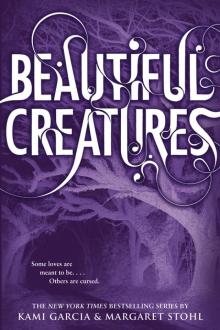 Beautiful Creatures
Beautiful Creatures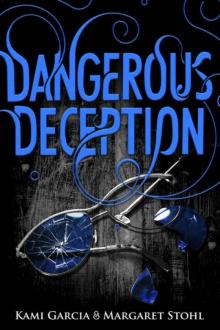 Dangerous Deception
Dangerous Deception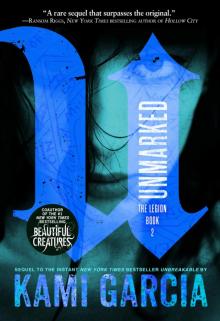 Unmarked
Unmarked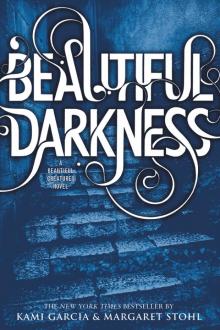 Beautiful Darkness
Beautiful Darkness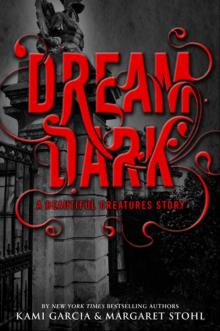 Dream Dark
Dream Dark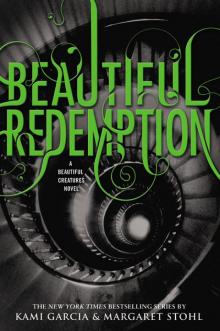 Beautiful Redemption
Beautiful Redemption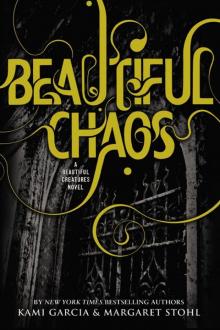 Beautiful Chaos
Beautiful Chaos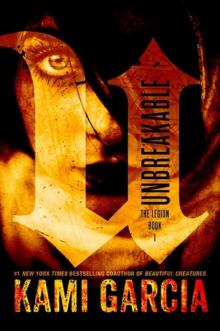 Unbreakable
Unbreakable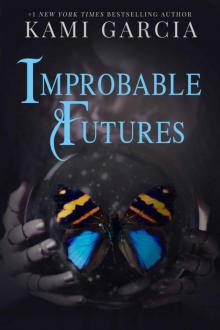 Improbable Futures
Improbable Futures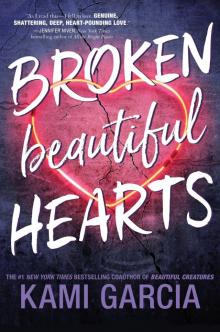 Broken Beautiful Hearts
Broken Beautiful Hearts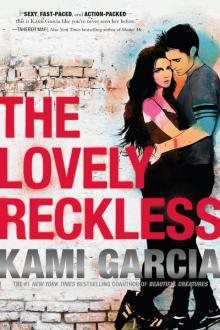 The Lovely Reckless
The Lovely Reckless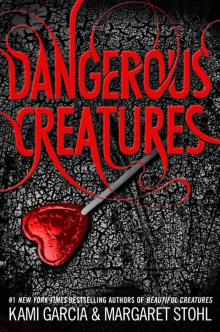 Dangerous Creatures
Dangerous Creatures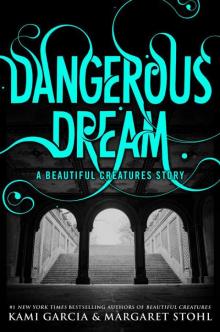 Dangerous Dream
Dangerous Dream The X-Files Origins--Agent of Chaos
The X-Files Origins--Agent of Chaos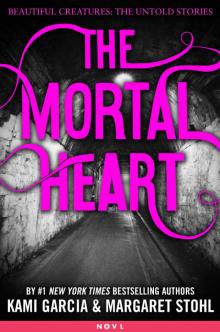 The Mortal Heart
The Mortal Heart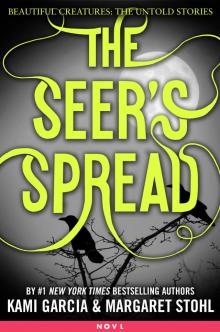 The Seer's Spread
The Seer's Spread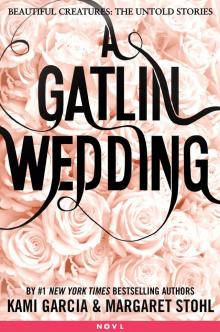 A Gatlin Wedding
A Gatlin Wedding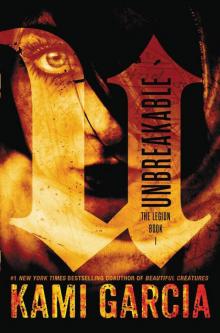 Unbreakable l-1
Unbreakable l-1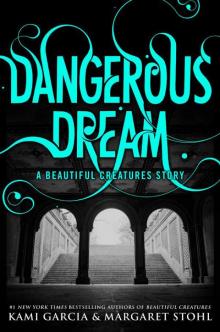 Dangerous Dream: A Beautiful Creatures Story
Dangerous Dream: A Beautiful Creatures Story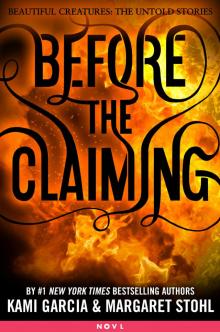 Before the Claiming
Before the Claiming